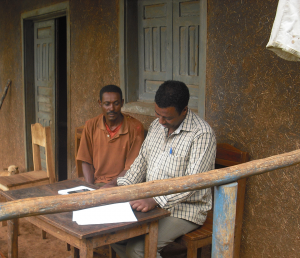ESSP Working Paper 147, by Mekdim D. Regassa, Gashaw T. Abate, and Zaneta Kubik.
Abstract: Increased deployment of agricultural extension agents (EAs) in rural areas is grounded on their importance to spur agricultural productivity and mitigate spatial imbalance in welfare. However, high turnover and low motivation level of EAs in remote areas pose a challenge for equitable services provisions and in some cases it exacerbates the geographic disparity. We assess the effectiveness of selected potential policy interventions to incentivize and retain EAs in remote areas of Ethiopia. To this end, we conducted a choice experiment to elicit the preferences of 761 EAs for job attributes. We applied a random parameters logit model to estimate parameters of interest and to simulate the impact of possible policy interventions. The main results show that offering continuing education opportunities after 2 years of service increases uptake of an extension job in remote locations by 77 percentage points, which is significantly higher that the effect from doubling current salary levels (70 percentage points). EAs also expressed strong preferences for availability of basic amenities, housing, transportation service and well-equipped Farmer Training Centers (FTCs). Furthermore, results from sub-sample analysis show that female EAs are less responsive to pecuniary incentives and are more concerned with availability of infrastructure and services. Current salary level, years of employment, and location of work are also important sources of heterogeneity in the response of EAs to potential policy changes. Download the PDF.
